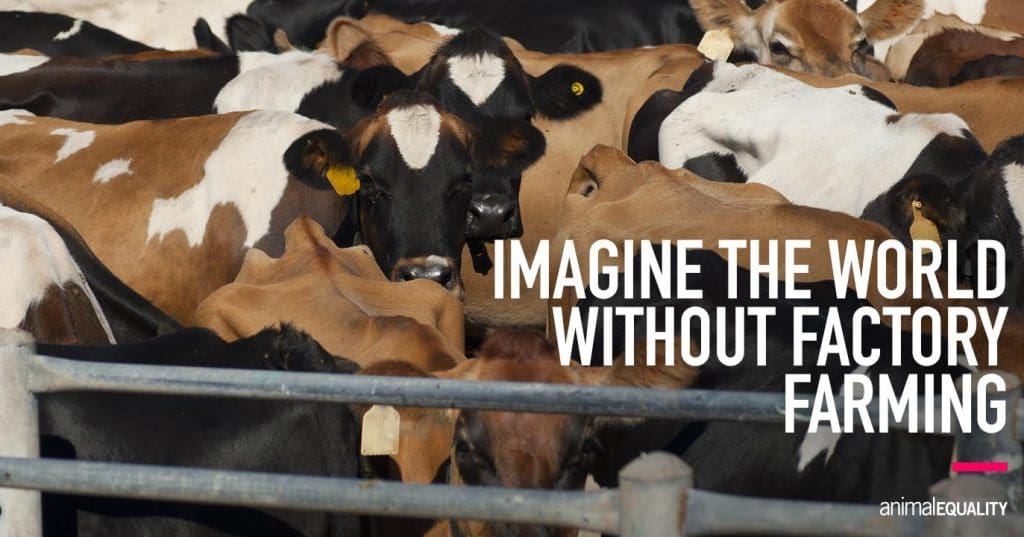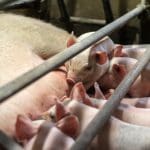As the world population continues to grow, the agricultural industry faces the daunting task of producing enough food to feed billions of people. However, traditional farming methods that heavily rely on animal agriculture have come under scrutiny due to concerns around animal welfare and environmental sustainability. As a result, there has been a growing movement towards agricultural innovation that seeks to revolutionize the way we produce food without compromising on animal welfare. This shift towards a more ethical and sustainable approach to farming has the potential to not only improve animal welfare but also address the pressing issues of climate change, food security, and public health. With advancements in technology and a growing demand for more ethical and sustainable food production, the future of farming without animal cruelty holds great promise. In this article, we will explore the concept of agricultural innovation and its potential to shape the future of farming, paving the way for a more ethical and sustainable food system.
Revolutionizing farming: innovative solutions await
As the world grapples with the challenges of sustainable agriculture and the ethical treatment of animals, the need for innovative solutions in farming has become increasingly evident. Exploring innovative agricultural practices such as vertical farming and lab-grown meat offers promising alternatives to conventional methods, with the potential to eliminate the need for factory farming while ensuring food security. Vertical farming, for instance, utilizes vertical space efficiently, allowing crops to be grown in urban areas, reducing the distance food needs to travel from farm to table. Lab-grown meat, on the other hand, offers a cruelty-free and environmentally-friendly approach to meat production, bypassing the need for traditional animal farming. These groundbreaking advancements hold the promise of transforming our food systems, revolutionizing farming practices, and paving the way towards a more sustainable and compassionate future.

Vertical farming: a sustainable alternative
Vertical farming emerges as a sustainable alternative that holds tremendous potential in revolutionizing agriculture. By utilizing innovative techniques such as hydroponics and aeroponics, vertical farming maximizes the use of limited space by stacking plants vertically in a controlled indoor environment. This method not only boosts crop yields but also minimizes water usage and eliminates the need for harmful pesticides. Vertical farms can be established in urban areas, reducing the carbon footprint associated with transporting food long distances. Moreover, these farms can operate year-round, ensuring a consistent supply of fresh produce regardless of seasonal limitations. With its efficient use of resources and ability to bring farming closer to consumers, vertical farming presents an exciting solution to address food security and sustainability challenges in a rapidly urbanizing world.
Lab-grown meat: cruelty-free protein source
Exploring innovative agricultural practices such as vertical farming is just one aspect of the broader movement towards a more sustainable and cruelty-free future in the food industry. Another groundbreaking development gaining momentum is the production of lab-grown meat, which offers a cruelty-free protein source without the need for traditional factory farming methods. Lab-grown meat, also known as cultured meat or cellular agriculture, involves growing real animal muscle tissue in a laboratory setting from a small sample of animal cells. This process eliminates the need for raising and slaughtering animals, thereby reducing animal suffering and minimizing the negative environmental impacts associated with conventional animal agriculture. With ongoing advancements in cell culture technology, lab-grown meat holds promise as a viable and ethical alternative to traditional meat production, contributing to agricultural innovation and the creation of a more sustainable food system that prioritizes animal welfare without compromising food security.
Ending factory farming: it’s possible
Ending factory farming: it’s possible. The exploration of innovative agricultural practices such as vertical farming and lab-grown meat presents a viable path towards eliminating the need for factory farming while ensuring food security. By diversifying our approach to food production, we can address the ethical concerns and environmental challenges associated with traditional animal agriculture. Vertical farming, for instance, allows for the cultivation of crops in controlled environments, using less land, water, and pesticides. This method not only reduces the strain on the environment but also provides fresh and nutritious produce year-round. Additionally, the emergence of lab-grown meat provides a cruelty-free alternative to conventional meat production, offering the same taste and nutritional value without the ethical compromises. With continued investment and support for these innovative practices, we can pave the way for a future of farming that prioritizes sustainability, animal welfare, and global food security.
The future of farming: cruelty-free
Exploring innovative agricultural practices such as vertical farming and lab-grown meat presents a promising future for farming without animal cruelty. By embracing these advancements, we can revolutionize our approach to food production and create a more ethical and sustainable system. Vertical farming, for instance, offers a solution that maximizes limited space while minimizing the use of resources like land, water, and pesticides. This method not only minimizes the environmental impact but also ensures a consistent supply of fresh and nutritious produce throughout the year. Lab-grown meat, on the other hand, provides a cruelty-free alternative to traditional animal farming, addressing the ethical concerns surrounding animal welfare. With cutting-edge technology, scientists are able to cultivate meat in laboratories, resulting in a product that is indistinguishable in taste and nutritional value from conventionally farmed meat. By embracing these innovative practices, we can redefine the future of farming and create a more compassionate and sustainable food system for generations to come.
Innovative practices for food security
Innovative practices for food security encompass a range of strategies that go beyond traditional farming methods. One such practice is hydroponics, a method of growing plants without soil, utilizing nutrient-rich solutions that provide optimal conditions for plant growth. Hydroponics allows for year-round cultivation, regardless of location or climate, making it a viable solution for food production in urban areas with limited land availability. Another innovative approach is the use of precision agriculture technologies, such as sensors and drones, to monitor and manage crops more efficiently. These technologies enable farmers to gather real-time data on soil moisture levels, nutrient content, and pest infestations, allowing for targeted interventions and minimizing resource wastage. Additionally, exploring alternative protein sources like insect farming and algae cultivation can diversify our food supply while reducing the strain on traditional livestock production. By embracing these innovative practices, we can enhance food security while minimizing the negative environmental impacts associated with conventional farming methods.
Vertical farming: growing up, not out
Vertical farming is an emerging agricultural practice that holds great potential in addressing both food security and sustainability concerns. As its name suggests, vertical farming involves cultivating crops in vertically stacked layers, utilizing indoor environments that are carefully controlled to optimize growing conditions. By utilizing vertical space, this innovative farming method requires significantly less land compared to traditional farming, making it a viable option for urban areas with limited available space. Additionally, vertical farming can reduce the reliance on harmful pesticides and herbicides, as the controlled environment minimizes the risk of pests and diseases. This method also allows for year-round crop production, unaffected by seasonal variations or adverse weather conditions. By exploring innovative agricultural practices such as vertical farming, we can revolutionize food production, ensuring a future without the need for factory farming while maintaining food security for a growing global population.
















































